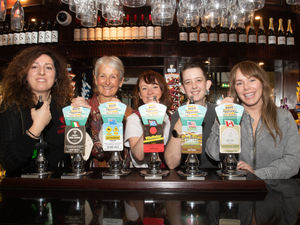WATCH: It ay all about how yow talks!
"Why do yow tork so posh?", writes Daniel Wainwright.
To the big lad in the playground, pinning me up against the wall of the school, it was supposed to be an insult.
Indeed from the age of about 10, until I finished my A-Levels, my lack of anything remotely approaching 'yam yam' was just another thing to add to the list of things that made me, in order of frequency of use, a 'geek', a 'square', a 'freak' and a 'loser'.
Then she played her gran a voicemail message I'd recorded to which she received the response: "She's going out with that?"
Accents matter, it turns out, when you're trying to impress someone. They shouldn't, of course.
People from working-class backgrounds are being 'systematically locked out' from working at elite companies, according to a report for the Social Mobility and Child Poverty Commission.
Then off I went to university, mixing with people from all over the country and every walk of life and it was the opposite extreme. To them it was as plain as a 'grae pae' with no bacon.
I started dating a privately educated girl from the south west who found my Birmingham accent hilarious so I played it up for her amusement.
But with so many people feeling it holds them back, what do voice coaches recommend someone do if they want to tone down their twang?
Maureen Theaker from Vocal Integrity says people have to listen to themselves.
"That's the really important part," she says.
"They know how they sound. But if we're going to change or alter an accent, then it means paying attention to those key vowel sounds.
"Then it becomes a question of making sure certain sounds do not creep in. One of the ways an accent is most noticeable is with the use of slang.
"People sometimes believe these slang words and phrases they have used all their lives are normal English. Another thing to be aware of is the amount of times you might say 'errr' or 'you know' or 'like'.
"I also suggest people listen to the way they say particular words. For example 'water' often gets pronounced 'wat-ah'. It's the same with 'daughter' being pronounced 'dor-tah'.
"It takes practice.
"But I don't recommend someone spend an hour a day doing this. What they learn is how to do this every time they speak. It's the psychological aspect as much as anything else. And after around eight to 10 weeks, someone should be able to tell the difference.
"Of course it varies from person to person."
Mrs Theaker's clients often include people with good jobs who feel their accent is holding them back from promotion, or knocking their confidence in some way. We happen to think the Black Country accent is more than a bit bostin' though and that people should learn to use the dialect, rather than get rid of it.
So here's a quick guide on how to spake propa:
Change the 'i' sound to 'oi', for example, 'ninety five' becomes 'nointy-foive'.
Forget making a cup of tea and brew yourself some tay.
And turn the 'ay' sound into 'air'. So instead of 'pass the paste', say 'pass the pairste.
A man is a mon and a baby is a babby.
And if you really want to nail the accent, the website weloveaccents.co.uk recommends all you need to do is practice singing I Will Survive:
Royal Holloway University found that as many as 70 per cent of job offers at the 13 top law, financial services and accounting firms went to applicants who had been to fee-paying or selective schools.
On top of that, Commission chairman Alan Milburn describes how these firms basically develop an unofficial 'poshness test', where travelling experiences, an element of 'polish' and more ensured that only those with the 'right' backgrounds make it through.
And it gets worse.
People from Birmingham are considered the least intelligent, according to studies by Lance Workman, of the University of South Wales.
"There is no correlation at all with actual intelligence and accent, so clearly this is stigma and stereotyping," he says.
And don't think just because you're Black Country through and through or you live in a particularly leafy bit of Staffordshire you'll be 'all roight, cock', your accent means those southerners will lump you in with the Brummies before you can say 'faggots and paes'.
Voice coach Maureen Theaker, founder of Vocal Integrity, specialises in helping people who want to lose their Midlands accent.
Mrs Theaker sees clients near Bantock Park in Wolverhampton, around half a dozen a week, and many of them are trying to get ahead in life.
"I find it a little sad that the Midlands accent gets this reputation time and again," she says. A lot of people who come to see me want to soften their accent. We have doctors, lawyers, teachers, social workers – all sorts."
Mrs Theaker and her colleagues work with people to concentrate on what they are saying, listening to themselves and the key vowel sounds.
"The most important thing is to be understood," she said.
The former Tesco boss Sir Terry Leahy said: "A sea change in approach is required throughout accountancy, law and similar professions."
For what it's worth, I simply don't buy the argument that a cut glass accent makes you better. It says more about the lack of self-esteem of those who do. Would anyone listening to Lenny Henry (soon to be Sir Lenny Henry) performing in Othello think this working class lad from Dudley was out of his depth?
Would anyone hearing Frank Skinner be laughing at his accent or the thing he's said? If anything, a touch of Black Country adds a little bit of steel to a barbed quip.
And what about Tom Watson, the Kidderminster-raised MP for West Bromwich East, now the front-runner to be deputy leader of the Labour party? Has his accent held him back? Sometimes the reverse is true. The Eton-educated Boris Johnson, the epitome of a posho, had to be sent up to the Wolverhampton to cut his teeth as a journalist when he worked on The Times. The young Boris spent time working with the Express & Star in the late 1980s, lodging with a landlady in Bilston, to gain a grounding in the real world.
Of course none of them are going for jobs with high flying law firms.
But the bosses running these businesses might want to think about broadening their horizons.
After all, what says more about the character, staying power and commitment of an applicant – that they used their university holidays to earn money and learn the importance of a day's work, or that they went to 'discover' themselves and stayed a night or in a hostel in Thailand with daddy's credit card 'for emergencies'? And when it comes to having the books and tax returns done, who really cares whether the accountant starts off with a cheery 'owamya', as long as he or she can add up?





